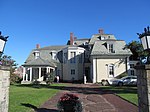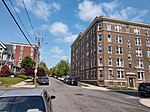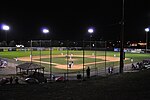Joseph Allen Skinner Museum
Churches completed in 1846Commons link is defined as the pagenameHistory museums in MassachusettsMassachusetts museum stubsMount Holyoke College ... and 4 more
Museums established in 1946Museums in Hampshire County, MassachusettsRelocated buildings and structures in MassachusettsSouth Hadley, Massachusetts

The Joseph Allen Skinner Museum is a cabinet of curiosities collected by silk magnate Joseph Skinner throughout his life. The collection is housed in the former First Congregational Church of Prescott, Massachusetts, which was built in 1846 and moved to South Hadley by Skinner in 1930 during the creation of the Quabbin Reservoir. Skinner, a benefactor of the college, deeded the entire collection to Mount Holyoke College following his death in 1946. Today the museum is maintained by the college's art museum. With the emergence of the COVID-19 pandemic in 2020, the museum has been closed indefinitely.
Excerpt from the Wikipedia article Joseph Allen Skinner Museum (License: CC BY-SA 3.0, Authors, Images).Joseph Allen Skinner Museum
Beech Street, Holyoke
Geographical coordinates (GPS) Address Website Nearby Places Show on map
Geographical coordinates (GPS)
| Latitude | Longitude |
|---|---|
| N 42.204722222222 ° | E -72.617777777778 ° |
Address
Wistariahurst Museum
Beech Street
01040 Holyoke
Massachusetts, United States
Open on Google Maps











